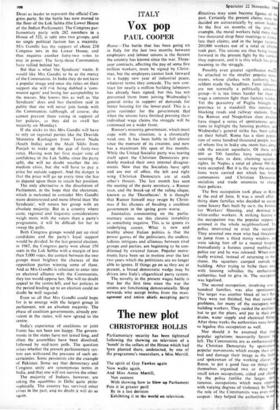INDIA
Who'll be boss?
KULDIP NAYAR
Neu• Delhi — The Congress party has looked like breaking up for years—indeed right back to the days of those legendary heroes such as Mahatma Gandhi and Jawaharlal Nehru. Yet the crisis would always blow over: the bridge of unity spanned all personal or factional chasms.
But in recent months vicissitudes of difference and compromise have been telling upon the party's coherence and eating up the reserve of camaraderie among the members. This time the old feeling that the party was condemned to agree in the end was no longer strong enough.
Ideologically the members of Congress have never been deeply divided because, like Hinduism. India's dominant religion, the party has meant everything to everybody. Even today, when the parting of ways has come, the two sides are vying with each other to avow 'progressiveness'. The true issue is simple: who is to be boss? Had the leaders faith in each other, this question would not have arisen, because since the death of Jawaharlal Nehru 'consensus' or 'collective leadership' has guided the destiny of the party. In other words the organisational and parliamentary wings ruled in condominium.
The present crisis, culminating in the organisation disowning the leader of the parliamentary wing, Mrs Indira Gandhi, began four months ago, when the two wings fell out over the choice of the party's nominee to fill the vacancy of Dr Zakir Hussain, the late President of India. Had it been only the organisational wing versus the parliamentary wing, the matter would have been more clear cut, as was the case in Britain some-years ago when Attlee was pitted against Laski. But here, in India, the Deputy Prime Minister, Mr Morarji Desai, who was a contender for the Prime Ministership in the past, was sided with the party's bosses, commonly known as 'the Syndicate'.
The majority of Congress MPS have ignored the organisation's directive and re- elected Mrs Gandhi as their leader. The minority has replied by choosing Dr Morarji
Desai as leader to represent the official Con- gress party. So the battle has now moved to the floor of the Lok Sabha (the Lower House of the Indian Parliament). The Congress par- liamentary party with 282 members in a House of 522, is split into two groups, and no single political faction has a majority. Mrs Gandhi has the support of about 210 Congress sirs in the Lower House, and thus requires another forty-two votes to stay in power. The forty-three Communists have rallied behind her.
But that is what 'the Syndicate' wants. It would like Mrs Gandhi to be at the mercy of the Communists. In India they do not have a popular image and once she relies on their support she will risk being dubbed a 'com- munist agent' and losing her acceptability to the masses. She knows this as well as 'the Syndicate' does and has therefore said in public that she will never join hands with the Communists (although, of course, she cannot prevent them voting in support of her policies, as they did to swell her majority on Monday).
If she sticks to this Mrs Gandhi will have to rely on regional parties like the Dravida Munnetra Kazhagam from Tamin Nadu (South India) and the Akali Sikhs from Punjab to make up the gap of forty-two votes. Having won her first major vote of confidence in the Lok Sabha since the party split, she will no doubt weather the im- mediate crisis, but she will have to pay a price for outside support. And the danger is that the price will go up every time she has to depend upon them to retain her position.
The only alternative is the dissolution of Parliament, in the hope that the electorate, which is reckoned to consider Mrs Gandhi more disinterested and more liberal than 'the Syndicate', will return her group with an absolute majority. But in a country where caste, regional and linguistic considerations weigh more with the voters than a party's programme, it will be difficult for her to sweep the polls.
Both Congress groups would put up rival candidates and the party's loyal support would be divided. In the last general election, in 1967, the Congress party won about 150 seats in the Lok Sabha with a margin of less than 5,000 votes, the contest between the two groups must brighten the chances of the opposition parties winning some of these. And as Mrs Gandhi is reluctant to enter into an electoral alliance with the Communists, they too would oppose her. She will no doubt appeal to the centre-left, and her policies in the period leading up to an election could no doubt be well sugared.
Even so all that Mrs Gandhi could hope for is to emerge with the largest group in parliament, not an absolute majority. The phase of coalition governments, already pre- valent in the states, will now spread to the centre.
India's experience of coalitions or joint fronts has not been too happy. The govern- ments in the states have not lasted long, and often the assemblies have been dissolved, followed by mid-term polls. The question arises whether the present parliamentary sys- tem can withstand the pressure of such un- certainties. Some pessimists cite the example of Pakistan. Some say that democracy and Congress unity are synonymous terms in India, and that one will not survive the other.
The majority of Indians, however, are taking the squabbles in Delhi quite philo- sophically. The country has survived other crises in the past, and no doubt it will do so again.







































 Previous page
Previous page